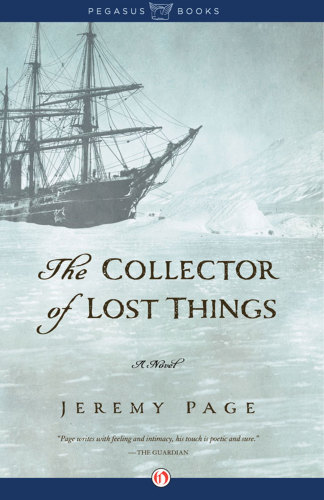
Collector of Lost Things
کتاب های مرتبط
- اطلاعات
- نقد و بررسی
- دیدگاه کاربران
نقد و بررسی

November 18, 2013
Moody and affecting prose buoys this strange and troubling account of an Arctic ocean voyage to the end of the earth, and the end of a species. Naturalist Eliot Saxby sails forth on the Amethyst in 1845 in an attempt to find surviving specimens of the Great Auk, a large waterfowl hunted to extinction, but the expedition quickly becomes an interior exploration of connections among the ship's officers, passengers, and captain, a troubled lot. Saxby is drawn to Clara, a mysterious figure who accompanies her cousin Bletchley, a novice gentleman hunter, but he is haunted by his previous history with this frail, troubled woman, whom he knows as Celeste. Her reasons for being aboard the ship are as arbitrary as Saxby's, whose mission is undertaken to settle a wager between unnamed gentlemen in a London club. The oppressive shipboard atmosphere builds in a somewhat overwrought manner reminiscent of 19th century gothic novels, but Page's descriptions of being under sail, and of the harsh and beautiful setting of the Arctic regions are gorgeous. Equally powerful passages about the reality of hunting and collecting are unsettling, from a brutal depiction of a seal hunt to the senseless killing of a pair of whales. The tension between Saxby's starkly defined moral sensibilities and the commercial motivations of the volatile Captain Sykes and his crew gives way to the narrator's own interior struggles, which are more complex than they first appear to be.

Starred review from October 15, 2013
Eliot Saxby, the collector of the title and narrator of the book, heads for the Arctic in search of the elusive--and perhaps extinct--great auk. The year is 1845, and Saxby makes his treacherous voyage on behalf of some English gentlemen who have a bet about whether there are any great auks that remain alive. Capt. Sykes is at the helm of the Amethyst, and he heads a crew of hardy and hardened sailors. Incongruously, also on the journey is one Edward Bletchley, an English gentleman, along with his cousin (or perhaps "cousin") Clara, an attractive young woman. Sykes has been paid to veer off his usual course to accommodate the ornithological pursuit of the naturalist Saxby. Although one mystery in the novel obviously involves the search for the last of the great auks, another involves Saxby's certainty that, 10 years earlier, he had gotten to know Clara under a different name, "Celeste," when he worked for her father, though Clara has no recollection of ever having met Saxby. They form a bond, and both become greatly excited when they discover a small colony of great auks on a remote island. Excitement turns to outrage, however, when Sykes announces that he plans to kill the last of the birds and thus guarantee their extinction, and their skins will therefore be immensely valuable to collectors and museums. Saxby watches helplessly while Sykes' crew methodically kills the auks, but he's able to conceal an injured auk on board. He and Clara carefully tend the auk, feeding it and nursing it. Miraculously, the auk even lays an egg, assuring the further existence of the species, but Sykes and his duplicitous first mate, Quinlan French, turn out to know more than Saxby suspects. Page shapes a fascinating historical narrative and has moving insights into our sometimes-dubious relationship to the natural world.
COPYRIGHT(2013) Kirkus Reviews, ALL RIGHTS RESERVED.

November 15, 2013
Page's maritime adventure pays tribute, in equal parts, to both philosophy and the environment. In 1845, with rumors of a great auk sighting swirling about, naturalist Eliot Saxby sets sail on the North Atlantic to discover if there is any remaining evidence of the once plentiful species. A flightless bird prized for its luxurious feathers, the great auk was hunted into extinction by the mid-nineteenth century. Proving to be much more than strictly a scientific journey, Saxby's voyage is a multilayered, often tortured exploration of the inner workings of one man's soul and spirit as he grapples with his own past, his weirdly creepy shipmates, and man's violent encroachment on the natural world. In addition to the haunting, gothic-tinged narrative arc, recommend this for Page's plaintive descriptions of the starkly bleak and beautiful Arctic.(Reprinted with permission of Booklist, copyright 2013, American Library Association.)

























دیدگاه کاربران